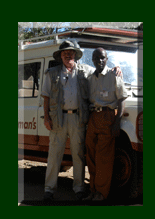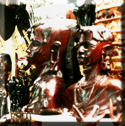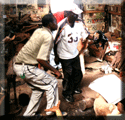

Merchants of Kenya...
make their living usually by selling, crafts, or goods that they make with their own hands. Jewelry, carvings from all kinds of materials, are everywhere in shops, along roadsides, and even in the lodges and camps where tourist and safari travelers stay. There are seldom prices marked on items, especially in emporiums that tend to be large metal buildings with literally thousands of pieces of art, paintings, carvings, jewelry, and artifacts. Carvings are by far the largest type of work sold. Carving is an art that is passed down from generation to generation. A father teaches his son, and the son teaches his son and so on. Carvers don’t sell their work generally, but spend their time carving and working, usually 6 days a week and 8 hours a day.




When a piece is sold... the salesman gets a percentage, the driver gets a small percentage, the company he works for gets a percentage, and of course the artist or carver gets his percentage with the store keeping the remainder. The store, or as they’re called, Emporium, provides materials, tools, and a “shop” where the artist works. The artist can be a carver, a rug or blanket maker, a seamstress, a jeweler, or potter etc.
These people sell their wares... in all locations and in some, like Thompson Falls which is a huge tourist draw and you will find one shop after another. Keep in mind, that these shops may be now more than a few posts set up with a metal roof over the top and sides of canvas, metal, thatching or whatever.
At Thompson Falls.... I had pretty young lady all dressed in a colorful skirt and blouse and a big hat come and take me by the arm and tell me that “You must come to my shop down around the corner here and see all the things I have to sell you!” Even though she was very insistent, I refused because, “I’m here on a mission, I have very little time, and must use it to shoot my pictures-I’m sorry.” You must be careful about going to “out of the way”, and “out of site” places with strange people.
Robbery is common... and there’s nothing you can do because if there are authorities, they’re in collusion with the shop owners or whoever. People are generaly very poor in Kenya. They work hard and long. They struggle and scramble to make ends meet. Crime is rampant everywhere, as is disease of all kinds. The mortality age in Kenya and Tanzania is under 50 due to
AIDS and Malaria.
People travel by bike... bus, and they walk miles upon miles with large bundles on their heads, or on the back of their bikes to sell their wares. Only the very few, very wealthy have motor vehicles and those that do are often related to the government, land owners, large store owners, or are into crime. Prostitution is everywhere and the saying that you can buy whatever you want is very true. It is best to stay away from any and all areas and things that could be crime related. No one will save you or care that you got hurt, injured, or robbed. You’ll file a report, and never hear anything from anybody. It’s all about connections and networking. Open free markets in the bigger cities are everywhere, and bartering is the name of how commerce works. Only in large stores that are westernized are there prices and retailers to help you. Then, in those places, you must use local currency, nothing, not even travelers’ checks are acceptable.
The people are all either Christian or Moslem... However, they all get along and religious debates are few and far between. It’s all about making a living, getting along, and being safe. Tribal communities still exist somewhat and they protect each other. In the outlying areas that are controlled by native peoples, there remains the native, pristine and natural way of life. Those peoples are reclusive, exclusive, and protected. The government does not allow entry or access to those peoples unless you’re connected to a paid tour, and a guided experience that’s paid for. Even taking pictures of Samburu warriors or their homes, or their animals is strictly forbidden. You must give something to get something, because they all have very little. Children hold out their hands for pencils, water, paper, anything that they can use in school, eat, or drink.
At a stop by Mt. Kenya... I gave away over 20 pens and pencils to the kids who ran from over a mile away-to see me and talk to me. They had just gotten out of church. At the lodge where I stayed in the Masai Mara, the manager of the bar told me that he worked from 6:00 AM until 12:00 Midnight every day of the week. He worked 10 months on and 2 months off. He lived on the lodge grounds in “staff quarters.” He was paid around $26-$30 a week. He did receive lodging and meals free-however, the staff is not fed what the lodgers or even the guides are fed. They may get leftovers if they’re lucky. In general, their working conditions are tough. Little if any “slack” is cut to anybody, and they work hard for tips-that’s their gravy money. But you have to be careful because you can’t let them know how much money you have on you.
The people have wonderful personalities... and all tend to be very nice-they’re living a struggle and their struggling to live. A manager’s job in a lodge is considered a very high ranking job. Jobs are not plentiful, and the number of people who live in slums-posted buildings with metal roofs, and sides, often with metal sides and dirt floors is overwhelming. There are over 100 million in Tanzania, Kenya, and Uganda alone.... continued below

At the end of my last trip...my guide, Albert, wanted to know if I wanted his daughter. He explained to me he couldn't afford to send her on to school beyond what we would term the high school level, and she needed work. He said she was a nice very attractive girl and he knew I was a nice man. He said, “I know you would take good care of her and send her on to school to learn a trade-so she could get a good job in America.” He said “he would be very honored and grateful if I would take her with me to America.” I had to explain to him that that wasn’t possible and that she would have to go through a process to get a passport, and that she could move to America as a legal alien but she had to do it the right way. It is very, very hard for women to get good jobs outside of the city.
That means, that many learn to be craftsman, artist, carvers, potters, welders, or whatever they can to make and sell things that tourist will buy, or that those who sell to others will buy.
Enjoy the characters and Merchants of Kenya... Each has their own unique story. If you come to one of my shows, just ask me about them, and I’ll be glad to tell you what I know of their story-or write to me.... greg-the ghostbear
Website Copyright Alannah K Ashlie 2005
All Rights Reserved


